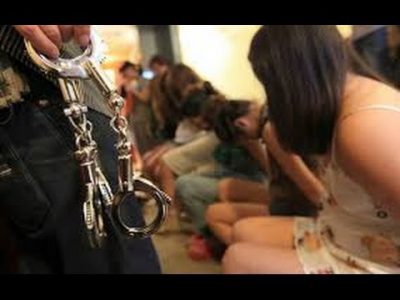Sex Trafficking: A Form of Modern-Day Slavery

All forms of modern-day slavery affect an estimated 40 million or more people worldwide – mostly women and young girls, ongoing in scores of countries, including America and other Western nations.
Human trafficking and forced labor in the US exists mainly in the following forms: prostitution, pornography, and related sex services, domestic indentured servitude, agricultural slavery, industrial sweatshops, exploited restaurant and hotel workers, entertainment exploitation, and involuntary mail-order brides.
The above practices persist for lack of enforcement of laws and regulations, poor or no work conditions monitoring, and a strong demand for cheap labor, enabling unscrupulous employers and criminal networks to exploit powerless workers for profit.
The International Labor Organization (ILO) defines forced labor as “work or service…exacted from any person under the menace of any penalty and for which said person has not offered himself or herself voluntarily.”
Forced child labor is:
“(a) all forms of slavery or practices similar to slavery, such as the sale and trafficking of children, debt bondage and serfdom and forced or compulsory labor, including forced or compulsory recruitment of children for use in armed conflict;”
“(b) the use, procuring or offering of a child for prostitution, for the production of pornography or for pornographic performances;”
“(c) the use, procuring or offering of a child for illicit activities, in particular for the production and trafficking of drugs as defined in the relevant international treaties;” and
“(d) work which, by its nature or the circumstances in which it is carried out, is likely to harm the health, safety or morals of children.”
US laws against sex and other forms of human trafficking include:
The 1910 Mann Act prohibits trafficking individuals across state lines to engage in prostitution or related offenses.
The 1930 Tariff Act includes provisions, prohibiting imports of goods made from forced labor. The 2009 Customs and Facilitations and Trade Enforcement Reauthorization Act has similar provisions.
The 2000 Victims of Trafficking and Violence Protection Act combats trafficking in persons, especially for sex, slavery, and involuntary servitude.
The 2003 PROTECT Act protects children from human trafficking and sexual exploitation.
Section 7202 of the 2004 Intelligence Reform and Terrorism Prevention Act established the Human Smuggling and Trafficking Center to combat the practice.
US Code, Title 22, Chapter 78 – Trafficking Victims Protection (2012) combats it in all forms, calling it “a contemporary manifestation of slavery whose victims are predominantly women and children…”
The problem with these laws is lax enforcement. America’s most vulnerable are poorly protected – all too often not at all.
Sex slavery in America is the nation’s most common form of involuntary servitude. Tied to organized crime, countless numbers of young women and girls are affected. Estimates range from 100,000 – 300,000.
According to a Justice Department assessment, pimps control at least 75% of exploited minors, intimidating them psychologically, threatening them with violence for noncompliance.
The Internet is a common recruiting tool, among other methods – targeting hundreds of thousands of runaway street girls and youths, luring them into prostitution, pornography, and related sex activities with false promises, holding them in bondage once involved.
Sex trafficking and other forms of involuntary servitude amount to a multi-billion dollar business. In 2014, the ILO estimated human trafficking earns around $150 billion annually worldwide – mostly from sex trafficking and exploitation.
It occurs in a variety of venues, including brothels, truck stops, at hotels and motels, residential apartments, as well as massage parlors fronting for prohibited prostitution and related sexual activities.
The issue made headlines when New England Patriots billionaire owner Robert Kraft was charged days earlier with two misdemeanor counts of paying for sex at an illicit massage parlor in Jupiter, Florida.
According to local police, body cam video evidence identified him during two visits to the so-called Orchids of Asia Day Spa. Around two dozens others will be charged separately – following a Palm Beach, Florida sex trafficking probe.
On the one hand, adult married men engaging in consensual sex with women above the legal age of consent in their state is no one’s business but their wives – provided women involved aren’t being exploited.
If sex with girls below the age of consent occurs, varying in the US by state, often below age-16 or 18, it’s a criminal offense even if voluntary, usually referred to as statutory rape or child molestation.
Soliciting sex at a massage parlor or other fronts for prostitution lets the practice connected to organized crime flourish – at the expense of exploited women and girls.
That’s why Kraft’s indulgence was abhorrent and a misdemeanor offense, likely resulting in a fine and perhaps mandated hours of community service.
Through a spokesman, he denied charges against him, a statement saying “(w)e categorically deny that Mr. Kraft engaged in any illegal activity. Because it is a judicial matter, we will not be commenting further.”
The massage parlor he visited faces more serious charges, the penalty to its managers likely to be much harsher, depending on specific violations committed, including likely human trafficking for sex.
Palm Beach County police said many women at the massage parlor Kraft visited were Chinese nationals – living at the establishment and not allowed to leave.
Ten similar county “spas” were investigated, around 300 arrest warrants issued, all establishments probed shuttered.
*
Note to readers: please click the share buttons below. Forward this article to your email lists. Crosspost on your blog site, internet forums. etc.
Award-winning author Stephen Lendman lives in Chicago. He can be reached at [email protected]. He is a Research Associate of the Centre for Research on Globalization (CRG)
His new book as editor and contributor is titled “Flashpoint in Ukraine: US Drive for Hegemony Risks WW III.”
http://www.claritypress.com/LendmanIII.html
Visit his blog site at sjlendman.blogspot.com.

